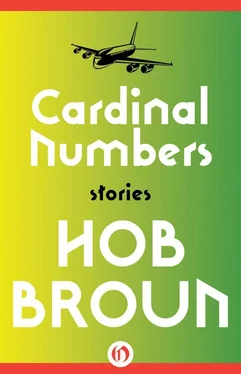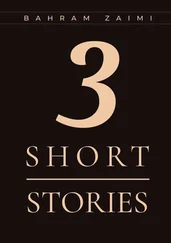Hob Broun
Cardinal Numbers: Stories
FOR WOODIE And JANE, ONE MAN’S FAMILY
EVEN IN MID-DECEMBER, wearing two sweaters, window glass rattling in dead putty there at the back of the shop, Schenck drank only ice water. It rippled on his throat, against the wall of his stomach. It cleared his palate and cleansed his bladder. He drank down a gallon or more in a day, not from an excess of thirst — his appetites were diffident — but vigilantly, to maintain a pattern of comfort and good feeling. Always, Schenck had guarded his habits.
Opening the minifridge balanced on phone directories and accordion files, he took a refill from the pitcher. Pain in his knuckles was best relieved by heat, and yet Schenck had never held a teacup with familiar reassurance as he held this glass. He bent back his head, let ice cubes fall against his teeth, saw the uneven black tin ceiling, and indulged an image of it giving way. Everything would fall around him, but nothing on him. Schenck’s safety of place held its own in the impacted city, amid all its reprisals.
Some lugubrious piano piece came over WNYC as he stood with his feet under the radiator by the display window and read a letter from a client in New Haven asking that he locate a particular translation of Heine. As a student in Vienna just after the war, Schenck had been inspired by the early lyrics, even memorizing parts of the Nordsee cycles. Storm-whipped waves and glistening crags. Schenck’s ambition then had been for the stage, to secrete himself inside the great roles. Iago, Cyrano, Faust. All sorts of peaks had been foreseeable then, a tame, benign delusion in which, no doubt, there was less sin than in the pride he now took in the humility of old age.
Buzzing of the security-wired door startled him badly. A tousled woman in high boots and a man’s raglan overcoat came at him.
“I need something for a girl eleven. Very bright. Loves animals.”
Her smile was ferocious.
“Pictures? Something with pictures?”
“That’s not necessarily what I meant.” The woman gestured curiously in front of her mouth as though drawing out a tapeworm and winding it on a stick. “She reads novels all by herself. Jack London. Dickens. Really quite exceptionally mature, I think.”
Schenck managed to sell her the memoirs of a nineteenth-century Irish veterinarian — hand-tinted engravings and marbled endpapers, twenty-five bucks. And then she asked him to wrap it.
“This is a department store? You see gift paper here? You want wrapping, go down two blocks to Wexel’s and buy some.”
SCHENCK dined alone, by candlelight, on smoked fish and macaroni salad. He ate too quickly, afterwards slowly drank his ice water, detecting synthetic undertones probably traceable to a plastic ice tray, which he now dropped in the garbage. No more of those.
The apartment over the shop, a series of low rooms off a long L-shaped passage, was too large for him. Three of these rooms he used only for storage. They were clogged with furniture and crates of books, armoires, washstands, a Peruvian hammock, brass lamps, Hogarth reproductions, a library bought blind three years ago from an executor in Mount Kisco and never looked through. And his bedroom, in the shorter leg of the L, was divided by folding screens, the half-space less shadowy, more settled.
And one room was empty except for the director’s chair in which he waited now by the window that gave onto the air shaft. He waited in the dark until past eleven — later than usual — when the light came on across the way as two opposing V’s projected from top and bottom of the lampshade onto the beige wall. Sheila came naked to the window and put her hands on the glass. She could look straight at him and still seem not to see. Graying hair was undone; breasts hung almost to her navel. She would stand there for five or ten minutes, swaying, expressionless, and then disappear.
This is a very long quarrel, he thought. I am not competent to judge.
Schenck had claim to a small period of marriage, and while he worked at resistance, this ritual at the windows inevitably stirred random memories of that time. He had been forty, newly a citizen, employed in a machine shop owned by Czechs. Penny was an obstreperous girl, and large. She had been raised on a dairy farm and referred to all other women as “heifers.” They were married somewhere in New Jersey with two strangers from a luncheonette as witnesses. Penny ate red meat at every meal, and liked to make love standing up. She couldn’t learn to drive but played competent chess. At the end of their third summer she left for a day at Rockaway Beach and never came back. In 1971 she mailed him divorce papers from Elko, Nevada, where she and the man she’d met on the subway were managing a ten-unit motel.
All that Schenck knew for certain about Sheila was her name. Data solicited in the neighborhood were conflicting: She was shy and retiring, snooty and arrogant, a high-average bowler, known to keep odd hours, deeply religious, a “cocktail waitress,” a divorcee from California. The informants all spoke with an unexampled lack of vehemence, as though describing a fictional character. Schenck had not decided anything, but as an adjective for her attraction he most often took up “opaque.” That seemed fair. Standing naked at her window, she was completely opaque.
By closing time on Friday, Schenck had written in his ledger these sales:
Wallace, Alfred Russell The Maylay Archipelago $ 10 –
(boards slightly foxed)
deAssis, Machado Philosopher or Dog? 8.50
Pynchon, Thomas Crying of Lot Forty-nine 35 –
(1st edition w/ wrapper)
Day total: $53.50
4.28 (tax)
Week total: $457.73
Year total: $28,693.19
Week avg. $562.62
At six-thirty, earlier than usual, Ugo tapped on the window. He held up a white parcel, gestured with his eyes.
“I was just about to go up,” Schenck said, now reengaging the locks.
Ugo stamped and blew and tugged at the ends of his long red muffler. He crackled the deli paper. “Lombardese braciola. Filet of beef cured in salt and then air-dried. It’s a little like prosciutto, only milder.”
Ugo had begun as a garrulous loiterer in the shop during breaks from rehearsal of an off-off production of Pirandello’s Right You Are (If You Think So) ; transforming himself from a nuisance into a friend had taken a year. Schenck’s spiny reticence made him unavailable to all but the truly persistent. And still Ugo needed to certify every visit with a gift. These had lately become more elaborate, and Ugo wore the slight, perpetual smile of a dolphin or a beluga whale. All by himself, without an agent, he’d bagged a gangster part, three months guaranteed, on the daytime serial, Edge of Night.
Easily annoyed but hard to embarrass, Schenck was both when presented with a dressing gown from Lord & Taylor.
Ugo said: “This is my first TV job with lines since I did an anti-Semitic janitor on The Defenders in 1962. Why shouldn’t we both enjoy it?”
And this was the Ugo who once had said that he yearned for subtleties but was trapped in a culture of noise.
They ate the braciola with capers and olive oil, finished with a romaine salad. Schenck poured Chartreuse for Ugo, ice water for himself, and they torpidly resumed their ongoing game of casino. Score: 18,201 to 18,169, Schenck leading. Ugo, naturally, saw this parity as a signal, if not a proof, of their fellowship, but Schenck called the game defective since luck determined what skill should have.
“It’s like a coin-flip experiment,” he said, sweeping in the ten of diamonds. “All that’s decided is that you can’t decide.”
Читать дальше












